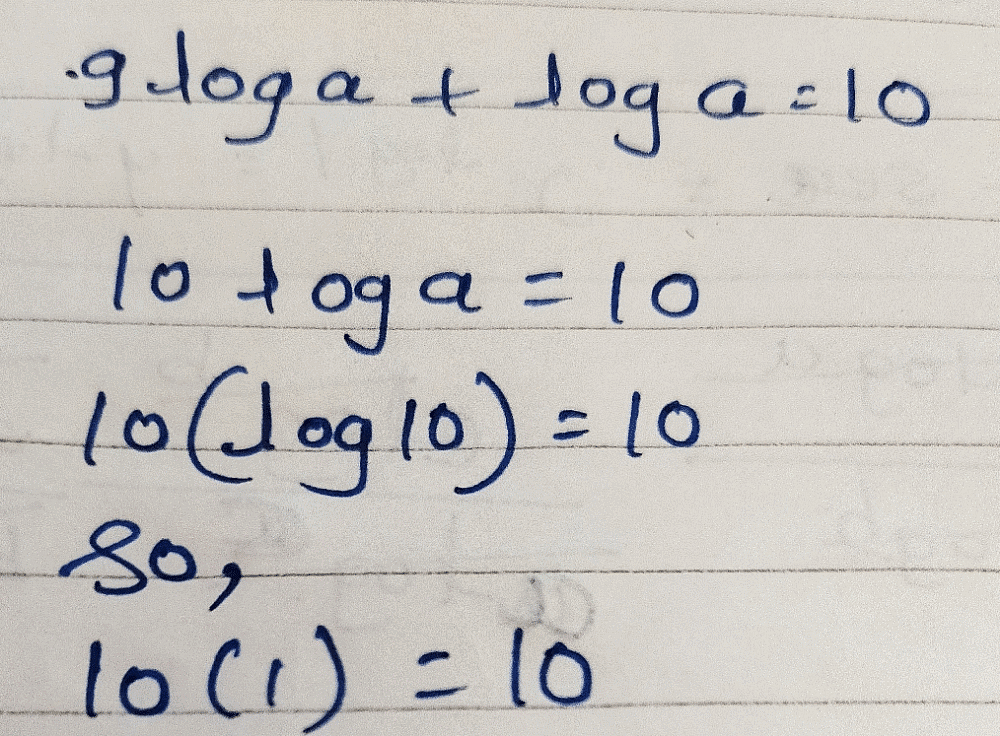CA Foundation Exam > CA Foundation Questions > Log(a9) loga = 10 if the value of a is given ...
Start Learning for Free
Log(a9) loga = 10 if the value of a is given by?
Most Upvoted Answer
Log(a9) loga = 10 if the value of a is given by?
Solution:
Given, log(a^9) = 10
We need to find the value of 'a'.
We know that, log(a^n) = n * log(a)
Using this property, we can write the given equation as:
9 * log(a) = 10
Dividing both sides by 9, we get:
log(a) = 10/9
Taking antilogarithm on both sides, we get:
a = 10^(10/9)
Therefore, the value of 'a' is 10^(10/9).
Explanation:
To solve this problem, we have used the properties of logarithms. The basic idea behind logarithms is that they help us to convert multiplication and division into addition and subtraction. This makes it easier to perform complex mathematical operations.
In this particular problem, we have used the property of logarithms which states that the logarithm of a power of a number is equal to the product of the exponent and the logarithm of the base. Using this property, we have simplified the given equation and obtained an expression for 'log(a)'.
To obtain the value of 'a', we have used the antilogarithm property, which states that the antilogarithm of a logarithm is equal to the original number. Using this property, we have obtained the value of 'a' in terms of 10.
Overall, this problem requires a good understanding of logarithms and their properties. With practice, one can become proficient in solving such problems.
Given, log(a^9) = 10
We need to find the value of 'a'.
We know that, log(a^n) = n * log(a)
Using this property, we can write the given equation as:
9 * log(a) = 10
Dividing both sides by 9, we get:
log(a) = 10/9
Taking antilogarithm on both sides, we get:
a = 10^(10/9)
Therefore, the value of 'a' is 10^(10/9).
Explanation:
To solve this problem, we have used the properties of logarithms. The basic idea behind logarithms is that they help us to convert multiplication and division into addition and subtraction. This makes it easier to perform complex mathematical operations.
In this particular problem, we have used the property of logarithms which states that the logarithm of a power of a number is equal to the product of the exponent and the logarithm of the base. Using this property, we have simplified the given equation and obtained an expression for 'log(a)'.
To obtain the value of 'a', we have used the antilogarithm property, which states that the antilogarithm of a logarithm is equal to the original number. Using this property, we have obtained the value of 'a' in terms of 10.
Overall, this problem requires a good understanding of logarithms and their properties. With practice, one can become proficient in solving such problems.
Community Answer
Log(a9) loga = 10 if the value of a is given by?

Attention CA Foundation Students!
To make sure you are not studying endlessly, EduRev has designed CA Foundation study material, with Structured Courses, Videos, & Test Series. Plus get personalized analysis, doubt solving and improvement plans to achieve a great score in CA Foundation.

|
Explore Courses for CA Foundation exam
|

|
Similar CA Foundation Doubts
Log(a9) loga = 10 if the value of a is given by?
Question Description
Log(a9) loga = 10 if the value of a is given by? for CA Foundation 2024 is part of CA Foundation preparation. The Question and answers have been prepared according to the CA Foundation exam syllabus. Information about Log(a9) loga = 10 if the value of a is given by? covers all topics & solutions for CA Foundation 2024 Exam. Find important definitions, questions, meanings, examples, exercises and tests below for Log(a9) loga = 10 if the value of a is given by?.
Log(a9) loga = 10 if the value of a is given by? for CA Foundation 2024 is part of CA Foundation preparation. The Question and answers have been prepared according to the CA Foundation exam syllabus. Information about Log(a9) loga = 10 if the value of a is given by? covers all topics & solutions for CA Foundation 2024 Exam. Find important definitions, questions, meanings, examples, exercises and tests below for Log(a9) loga = 10 if the value of a is given by?.
Solutions for Log(a9) loga = 10 if the value of a is given by? in English & in Hindi are available as part of our courses for CA Foundation.
Download more important topics, notes, lectures and mock test series for CA Foundation Exam by signing up for free.
Here you can find the meaning of Log(a9) loga = 10 if the value of a is given by? defined & explained in the simplest way possible. Besides giving the explanation of
Log(a9) loga = 10 if the value of a is given by?, a detailed solution for Log(a9) loga = 10 if the value of a is given by? has been provided alongside types of Log(a9) loga = 10 if the value of a is given by? theory, EduRev gives you an
ample number of questions to practice Log(a9) loga = 10 if the value of a is given by? tests, examples and also practice CA Foundation tests.

|
Explore Courses for CA Foundation exam
|

|
Suggested Free Tests
Signup for Free!
Signup to see your scores go up within 7 days! Learn & Practice with 1000+ FREE Notes, Videos & Tests.

























